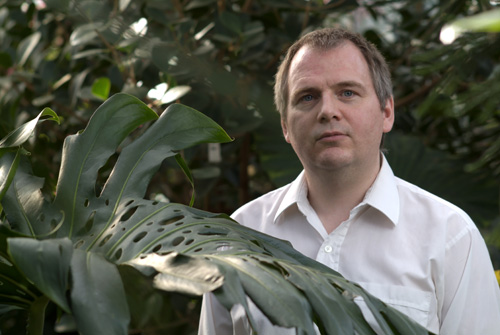
Even among a swarm of apiarists at the largest beekeepers’ event on the continent, Stephen Humphrey stood out. The Toronto writer had donned a new beekeeper’s suit he’d picked up at a trade show at the North American Beekeeping Conference in Orlando, Fla., in mid-January.
“I was simple to spot as the tourist among seasoned beekeepers,” wrote the Toronto poet and journalist in an entry in his blog, called Bee Attitudes. “I had the white bee suit; they were in shirt sleeves. I looked like a B-movie spaceman among these unsuited apiarists.”
Now, sans suit, he’s hoping to get closer to bees as a pollination studies writer-in-residence within the Canadian Pollination Initiative (CANPOLIN), a national strategic research network based at U of G. Funded by the Natural Sciences and Engineering Research Council, it connects some 50 Canadian scientists at universities and research centres, including seven Guelph faculty.
Humphrey is spending at least two days a week at Guelph learning and writing about bees, pollination and ecology. CANPOLIN has provided office space in Graham Hall and will give him access to researchers and resources on campus.
Besides working with network staff — including scientific director Peter Kevan, a retired professor in the School of Environmental Sciences (SES) — Humphrey expects to make more than a few visits to Guelph’s apiculture centre at Townsend House. He will also take part in a field study course in the United States this month.
Sarah Bates, CANPOLIN’s network manager, says his connections will help increase the network’s visibility and public awareness among varied audiences.
Last year Humphrey received a $40,000 Chalmers Arts Fellowship from the Ontario Arts Council. Having already begun researching and writing about bees, including two poems published recently in a new anthology called A Verdant Green, he came to Guelph after learning of CANPOLIN.
He’d kept hearing about U of G while researching earlier pieces. “Bee research kept coming back to the University of Guelph,” he says.
For the next two years, Humphrey will continue writing about bees, including blogging, non-fiction, journals and poetry. He’s also planning a collection of prose poems based on bee extinction.
“Pollination studies writer-in-residence is a unique position because most writer residencies are based in English departments,” he says, adding that the position reflects multidisciplinary views in SES and at U of G. (Last fall, Julie René de Cotret set up shop in Graham Hall as the school’s artist-in-residence.)
Humphrey, whose mother and stepfather run an apiary in Alberta, says he’s always been attracted to bees, including the “almost mythological” nature of a colony’s life cycle centred on a single queen. “I like them — they’re just fascinating little beings.”
Although he’s CANPOLIN’s first writer-in-residence, Humphrey is hardly the first U of G poet to draw inspiration from a hive. SES professor Madhur Anand, a published poet, turned a departmental visit to Townsend House into Picnic at the Apiary, published in The Malahat Review in 2008.